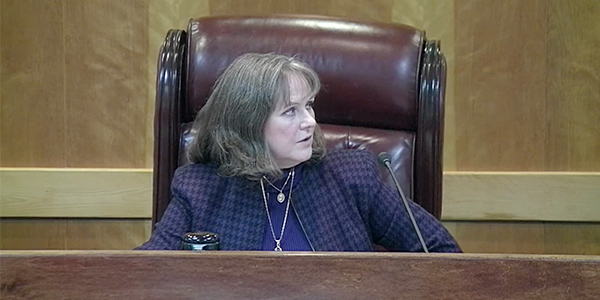By Tom Kleckner
Walker Pushes for Improved RC-to-RC Agreements with SPP, MISO
Texas Public Utility Chair DeAnn Walker said last week she has asked ERCOT, SPP and MISO to work together to improve the reliability coordination (RC) agreements among the grid operators.
Walker told her fellow commissioners she wants to ensure the grid operators’ RC operators understand their responsibilities and “can act on those responsibilities.”
“I believe all three regional coordinators would agree the documents we have now could have more clarity,” Walker said during the PUC’s Nov. 8 open meeting. “My intent is for them to work through those agreements, so there’s more clarity … for reliability purposes.”
Walker said she last month discussed her intentions with SPP leaders, who assured her their staff would work with ERCOT staff “to get something done by the end of the year.” She said she is also working on setting up a meeting with MISO CEO John Bear.
Separately, SPP and MISO are working to improve coordination across their seam following January and September events this year. (See “SPP-MISO Operating Procedures not yet Documented,” SPP Board of Directors/Member Committee Briefs: Oct. 30, 2018.)
Walker’s concern is over the use of switchable generating units, interconnected to other regions but available to ERCOT. Its most recent seasonal assessment of resource adequacy listed 3.7 GW of installed capacity as being available to the Texas grid operator in an emergency situation.
“We’re not trumping [SPP and MISO] on a reliability need to their system,” Walker said. “If they say they’re not willing to release [switchable units], we have options here in ERCOT we can use for reliability purposes.”
Walker said she was also driven to share her work with Commissioners Arthur D’Andrea and Shelly Botkin because of “a lot of discussion out there misrepresenting what I’m trying to do.” As an example, she pointed to opposition to an ERCOT revision request that would add a new resource status code for switchable units.
“There’s so much pushback on very reasonable things,” Walker said. “To me, it’s all about reliability. Ratepayers in ERCOT have been paying for the transmission to interconnect these units. They should have some reason to be here for reliability.”
PUC to Discuss Market Changes
The commission agreed to reserve time during its Dec. 7 open meeting for a broader discussion of potential changes to ERCOT’s market, including real-time co-optimization and incorporating marginal losses into dispatch decisions (Project 48551).
Both proposals have varying degrees of stakeholder support. Staff have been asked to provide additional information and offer recommendations on the proposed changes, which were the subject of two workshops last year. (See ERCOT, Regulators Discuss Need for Pricing Rule Changes.)
Walker said she is hopeful about “getting those things behind us,” despite apparent stakeholder concerns that the PUC is moving too quickly.
“I’ve been astonished in the past week by people saying we’re rushing to a decision on this,” Walker said, noting potential market reforms were before the commission when she joined last year. “It doesn’t feel like much of a rush to me. I guess people judge rushes differently.”
Enforcement Actions Result in $2.83M in Penalties
The PUCT released a report detailing its enforcement actions for the 2018 fiscal year.
According to the “2018 Summary of Customer Complaints and Enforcement Activities,” commission staff concluded 114 investigations, with results ranging from fines and license revocations to findings of no violation. The PUC approved orders imposing $2.83 million in administrative penalties and returning more than $108,000 in refunds to Texas ratepayers.
“The Texas Legislature created a level playing field for the companies competing to serve utility customers, and it’s our job to throw penalty flags for infractions,” Walker said in a release.
Electric retail and wholesale issues accounted for 40% and 24%, respectively, of the investigations. Water (25%), electric service quality (9%) and telecommunications (2%) made up the rest.
Non-IOUs Get Rate-Review Schedules
In other actions, the PUCT approved a rate-review schedule for non-investor-owned transmission service providers (Project 48377) and modified a previous order granting Oncor a certificate of convenience and necessity for its Far West Texas Project (Project 48095). (See PUCT Grants Oncor CCN for Far West Texas Project.)
During their executive session, the commissioners agreed to intervene in two Entergy dockets before FERC:
Entergy Services’ request to transfer its ownership interests in two transmission control centers to Entergy’s operating companies (EC19-18). The centers are in Jackson, Miss., and Little Rock, Ark.
Entergy Services’ filing of an unexecuted joint ownership and operating agreement that identifies the terms and conditions of the operating companies’ ownership of the control centers (ER19-211).




